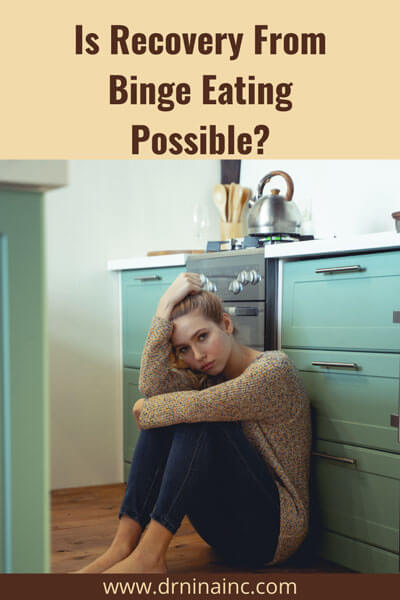Dr. Nina Savelle-Rocklin
Is Recovery From Binge Eating Possible?
Table of Contents
- How to heal your relationship with food
- I am here to tell you Liberation is POSSIBLE!
- Food wasn't really the problem
- I broke free from the Diet-Binge Cycle and so can you
- F for ‘feelings'!
- What are the ‘Feelings' we want to avoid?
- Culture that ignores feelings
- How do you acknowledge your ‘feelings'?
- There's More to the Story!
Let me start by saying I don’t believe in recovery from binge eating.
Binge eating is NOT the same as recovering from alcohol addiction or drug addiction, where your body may have become addicted to the substance.
Binge eating may feel like the same thing, but it’s not the same. In fact, it has more to do with your feelings and how your unconscious mind has learned to deal with them. I’m talking about ways to heal your relationship with food and yourself so you can enjoy life.
How to heal your relationship with food
Many people have said something to me like, “I know I’ve got to deal with this the rest of my life.”
Then, I tell them, “NO! Absolutely not! This is not something you have to think about for the rest of your life.”
Finally, I tell them to think of it more like “liberation.”
Liberation means freedom, once you’ve dealt with WHY you’re bingeing. It means you will be able to find new ways of coping so that food becomes a delicious part of life, not your best friend and worst enemy.
Food becomes yummy instead of scary. You get to wake up and think about your day, not your diet. How awesome is that?

I am here to tell you Liberation is POSSIBLE!
I am living proof that liberation from binge eating is possible.
First, I started becoming preoccupied with food as a young child. Afterward, it continued through high school and college.
I would diet, count calories, restrict what I ate, and sometimes purge. Of course, I literally did all of the eating disorder behaviors you can think of.
I was so worried about how people viewed me. Also, I constantly looked for approval from all of the adults in my life. Specifically, this included my parents, ballet instructors, gymnastics coaches, and teachers. This went on until I started seeing a therapist for anxiety in college.
Food wasn't really the problem
I told my therapist everything about myself – my relationships, dreams, hopes, and fears. We talked about EVERYTHING except my relationship with food.
I was scared to tell her about that. I felt guilty, ashamed and was worried that she would judge me. So I just went to therapy week after week.
Here’s the strange thing…even though we NEVER talked about it at all, all of my disordered eating problems were gone by the time I left treatment.
My eating issues were healed without ever talking about them because of the simple fact that food wasn’t the problem. I thought it was, but food was really the solution to my problem.
My real problem wasn’t food. I was obsessed with food and my body because I had a harsh inner critic and struggled with perfectionism.
The truth is, I didn’t feel like I was enough. It was something that was outside of my awareness. This is why I couldn’t figure out why I struggled so much.
After a while, I learned how to love myself, and with that love came healing. My eating disorders went away because food wasn't really the problem, to begin with.
I broke free from the Diet-Binge Cycle and so can you
I’m proof that you can radically and permanently transform your life and relationship with food.
Many people who struggle with food describe themselves as “broken.” They really think there’s something wrong with them.
I have news for you. You aren’t broken. You're just stuck.
You learned this way of relating to food and to yourself. You can unlearn it and create a whole new way of interacting with food.
There definitely is hope! You're not addicted to food.
It's not about control. It's not about willpower (even though it may feel that it is).
The problem is ‘feelings' or what I call the F word.
F for ‘feelings'!
In our culture, it seems like we’ve gotten the idea that you are supposed to avoid feelings? Feelings make you weak or are bad.
Sometimes we are even told that we are weak if we show emotions and strong if we push them away. Because of this, many of us get the idea that “there’s something wrong with feelings.”
With these cultural prohibitions against feelings, it’s no wonder that many of us can’t really even recognize the emotions that we are experiencing. We tend to push them down, and they may even be out of our awareness.
What are the ‘Feelings' we want to avoid?
In no particular order, they include…
- Anger
- Sadness
- Anxiety
- Guilt
- Shame
- Loneliness
- Helplessness
Feelings may be out of our awareness, but they are still in operation.
Feelings may be hidden, but they still impact our choices. We look for ways to cope with them so we can feel better.
That's where food comes in.
Why?
Culture that ignores feelings
We experience comfort and love when we are being fed as infants. It’s our very first experience. We're held in our parent's loving arms, and we feel safe (as we are being nourished).
Additionally, we live in a culture that ignores feelings and says that we should just ‘be positive.'
That’s not really a great way to cope or handle anything.
Here’s the deal. You can't positive-think away your feelings. You can't ignore them or “just let them go” either.
Ideally, when we're upset, we should soothe ourselves with words. We talk through them, but we don't live in an ideal world.
For this reason, many of us never learn how to soothe ourselves or productively resolve our feelings. If you never learned how to soothe yourself, you’re more likely to turn to food for comfort.
It’s what you learned that was soothing as a baby. We can get so good at comfort-eating sometimes that we quickly turn to food and don't even know that we're upset.
If you ask yourself why you are eating, you might come up blank. Oftentimes we think we’re bored or we’re stressed.

How do you acknowledge your ‘feelings'?
The next time you turn to food, I encourage you to pause and ask yourself the following questions…
“What feelings am I having right now?”
“What am I really craving right now that isn’t food?”
“If I wasn’t thinking about food, what WOULD I be thinking about?”
The answers might be unclear at first because we so often use food to avoid emotions and conflicts. The more often you do this, and the more curious you are, the easier it will be to discover the answers for yourself.
This is the first step toward liberation.
The next step is to be kind to yourself.
No matter what you’re feeling, talk to yourself as if you were talking to someone you love.
Be kind to yourself and talk to yourself in a comforting way. Validate and acknowledge what you’re experiencing.
Give yourself comforting words. It's a more effective way of responding to yourself and will make you less likely to seek comfort from food.
The more you do this, the more you see that it becomes a habit. You will change the relationship that you have with food.
Practice makes progress.
There's More to the Story!
Unfortunately, for most of us, the answers are hidden from us. That’s why I developed a way to get to those hidden reasons you're eating and help you to change your relationship with food.
There are clues, and I can help you discover them for yourself.
It’s not an overnight cure, but you can see results and experience something like this…
Imagine sitting down for a meal and eating anything that you want. You are savoring each bite, and you stop when you’re satisfied. As well, you enjoy every bite and don’t have a bit of guilt later. That may sound impossible, but I promise you it’s not.
One of the members of my online program, Kick the Diet Habit, wrote to thank me for helping her. She completely transforms her relationship with food. She said:
“I was at a restaurant today with some friends and realized that the bread in the breadbasket was nearly gone, and it never even crossed my mind to eat any. I’m seriously a free woman!
I am allowing myself to eat whatever I want…. And starting to not want or need it. I’m being so kind to myself, and my confidence is through the roof. I felt so powerful. This program is working to free me!”
It’s so gratifying to see so many women and men liberated from food and living their best lives!
If you’d like to experience that kind of freedom, you can download my free Food-Mood Formula guidebook and take the next step toward liberation from food, weight, and body image issues.
Sick of obsessing about every bite?
GET THE CURE
The Binge Cure Book!
Enter “CURE” to receive a 20% discount.
No, I don’t want access to this terrific resource to help me overcome binge eating.
The Author

Dr. Nina Savelle-Rocklin is a renowned author and podcast host and one of the nation’s leading psychoanalysts known for the psychology of eating. Her signature message of, “It’s not what you’re eating, it’s what’s eating ‘at’ you” has resonated with hundreds of thousands of listeners from around the globe in 40 countries. As founder of The Binge Cure Method, she guides emotional eaters to create lasting food freedom so they can take back control of their lives and feel good in their bodies.
Related Blogs





















